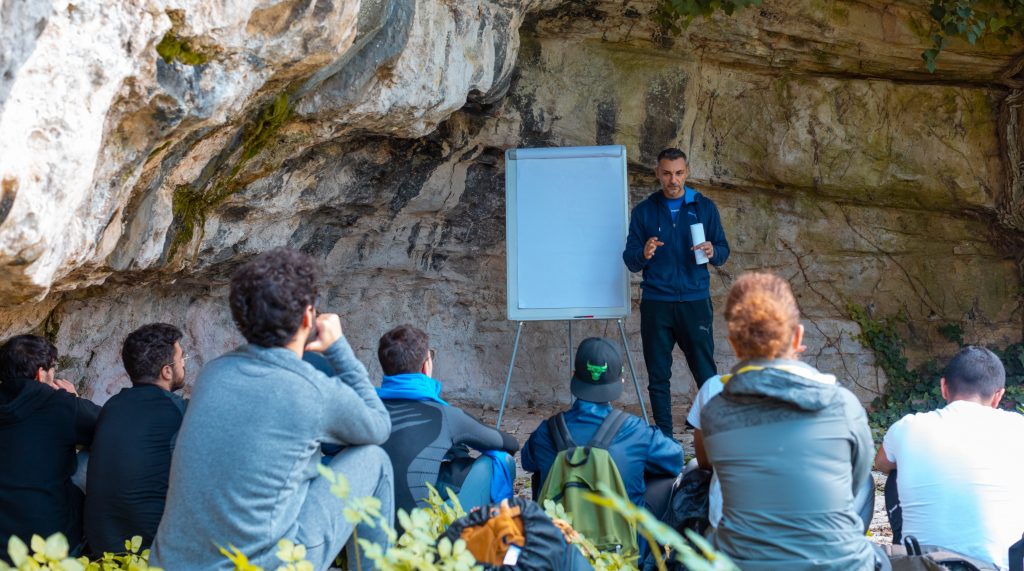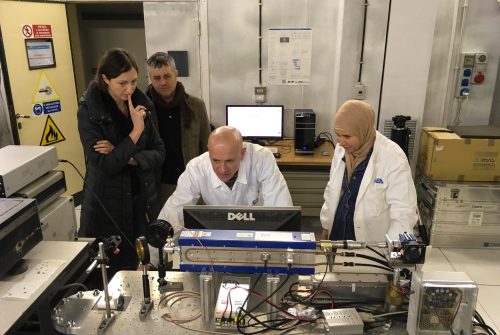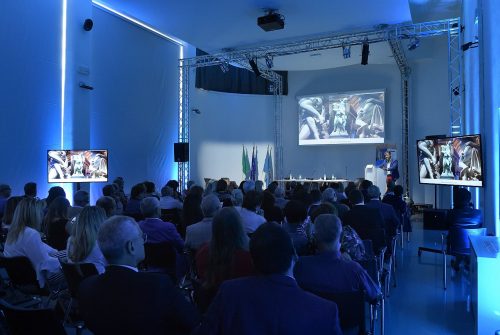“Renewing to innovate”, a new perspective in training
22 January 2019 | Written by Giovanna La Vecchia
We interviewed Danilo Carboni, with whom we talked about training, neuroscience and change
The world of work changes at a speed that we can define exponential. In this context, training and the acquisition of transversal skills become fundamental.
Danilo Carboni, coach and facilitator, professional in the field of behavioral training, has been dealing with “people” from every angle, for over twenty years, using different methodologies, supporting them to a constant study and deepening. Get out of the more or less consolidated box to renew old settings, now outdated and no longer effective: This, in short, is his new perspective. But let’s analyze how to achieve it.
Experimentation, curiosity, research and a lively spirit, in addition to the results achieved over time, have “stimulated” Danilo Carboni to “stimulate”, “because if it is true that I transmit as much information as possible, my main goal is to realize in each of my interlocutors the ability to produce their own results and advantages. It may seem simple, especially today with all the available technologies many will think that a “human” figure of reference is not even necessary. But it is not like that”.
From the innovative modalities in the management of the classrooms (no longer the classical training room), to the study of learning through stimuli and methodological approaches that are profoundly different from the past. Metaphorical activities, in addition to those purely mental, use of cognitive ability, but also emotional, study and analysis of the so-called “other intelligences” that must be coordinated. Entertainment is certainly among the skills of the facilitator, because “people learn best when they experience associated emotions in diverse contexts with multiple demands”.

Danilo Carboni explained his story to the readers of Impactscool.
Behavioral training seen as a means for the development of the person at 360 degrees has always fascinated me and allowed me to study with great curiosity all the disciplines and methodologies that I found useful for this purpose. I was so interested in NLP (neuro-linguistic programming), Emotional Intelligence, Coaching, I drew on knowledge derived from psychology and neuroscience by integrating them and using them in every field where “the person” acts, moves, creates, learns. And yet I have verified the results in the field and I have adapted the theory to practice over the years letting me contaminate the new world in continuous movement at a dizzying speed, aware of the fact that we are responsible for a necessary adjustment process from which we must let ourselves “help” for to be able to “help”.
Being a pragmatic and goal-oriented person, I look for and study models that facilitate adult learning as quickly as possible and in a lasting way. From here my insights and specializations in metaphorical and experiential training methodologies in indoor and outdoor. I participated in the design and implementation of numerous innovative programs for the development of skills in human resources, comparing with companies operating in different market sectors. I believe a lot in the network and in sharing; from my point of view all the opportunities for exchange are precious. For this reason, I am also active in various associations working in the field of adult learning training, presiding over several years in the regional board of “AIF” (Italian Training Association).
Training with which objectives for the market?
Put man in the middle; this must be the watchword also and above all in the world of formation. People have gone into the background of work, processes and business results and this system can only collapse in the long run. Some companies are aware of this by focusing on internal welfare systems and the enhancement of the individual. One of these is training, but what kind of training do we speak?
The formation that I propose wants to promote the culture of renewal starting from man. The formation of human capital is still the winning factor in business innovation processes. It is necessary to rediscover the value of the human being and of his journey towards his own realization, otherwise there is no future for us. The true and lasting learning of people will be based on the involvement of all human dimensions. Mind, heart, body, spirit, thought, feeling, action, relationship, senses.
Neurosciences and new knowledge on the functioning of the human being. How important is it in the training process?
Adults learn when we are able to stimulate them through new observation points of reality in a meaningful and credible way for them.
Andragogy, a discipline that studies adult learning, has already theorized all this and the neurosciences today, scientifically revealing the functioning of our brain, are confirming some theoretical concepts and making new insights. For example, today we know with certainty that human beings present neuronal cells in other organs that are not the brain. We also have neurons in the heart and in the digestive system. Therefore our decisions and our behaviors are the result of the combination of information coming from different ‘thinking centers’ with different characteristics.
What is the impact of changes on our brains?
There are changes triggered by globalization, new technologies and communication channels. Everything is changing exponentially and our brain also changes. Neuroplasticity of the brain allows a continuous adaptation, especially in young age. This means that even the systems and methods linked to education and training must change because they risk being inadequate for the new user. This will be the challenge of the trainer/facilitator/coach of the future. In 20 years of experience in contact with the world of education, I have witnessed on the one hand a profound transformation of the audience and another a poor adaptation of the training sector. For this I have worked in associations and sector communities to start a process of renewal. People today are more oriented towards information rapidity and are much more distracted. Keep them in the classroom for eight hours is a violence and above all it is not very effective not to say useless. People tend to privilege more and more the visual channel, the experience, the emotional involvement and the appropriate technological supports.
This is what we must be able to offer for the future.
The importance today of innovative methodologies in direct contact with the person. How much is needed in a market increasingly rich in technology and tools that are easy to use?
New approaches to learning are needed both in the planning phase and in the implementation phase. The crucial questions to ask are:
– What is the purpose of training today?
– How should the new training be to fulfill its purpose and be effective?
– Who is the trainer? What does it represent and what should it be able to interpret?
- Today the goal of behavioral training is not to educate but to facilitate learning. People are considered an active part of the process and able to give better answers to the challenges that are set before and which continue to change.
- A formation that considers changes and is willing to change following the inclinations of both individuals and the new world.
- At the same time an author, a director, an actor, a critic must always plan new and compelling paths, be able to explain the project and conduct the organizational aspects cooperating with other figures (HR, organizers, technicians, teachers), interpret the role as a host and entertain the public in an elegant and credible way. Finally, he must be able to draw indications from the results of his work to improve and improve the process.
Some innovative methodologies: Action Learning, E-learning, business game, use of metaphor, storytelling, business theater, forum theater, cinema, outdoor training, brain storming, coaching, community of practice, creative workshops… a new fascinating world which must be presented and represented with vitality and strength. We must be incisive and active, not aggressive or dominant (as often happens with technology), we must leave space to the other so that we feel the protagonist of his own change, not used for change, but decisive with its uniqueness, singularity, specificity. This is the fundamental role of the trainer.
Forecast for tomorrow?
There may be a return to the person. It will not be the contents that make the difference, but the way they are served. The ‘how’ will always be more important than the “thing”. The purely technical training, functional only to the acquisition of specific operational instructions, will be delegated to technological systems and artificial intelligence. The human trainers/instructors will disappear. Behavioral training will be mixed. A part of the acquisition of theoretical models and basics will be managed by e-learning and/or artificial intelligence platforms and the practical part will remain in the hands of expert facilitators who will have to develop very high specific skills (emotional intelligence, techniques and learning methodologies). Much of the training will take place online through exchange platforms “. All this, however, should not be scary, I am referring above all to the old generations, on the contrary, it represents an incredible stimulus, a new challenge, an important goal, but only if all the various elements are considered as one complex and rich “package”. We must learn more and more to integrate. The error, I believe, lies precisely in this “missed vision”. The progress, the speed, the excess and the abundance of everything, pushes us to “unpack” identifying from time to time a single part of the multiple, on which we then focus all our attention. We must never lose sight of the vitality and the great strength contained in a precious and indispensable whole. Everything is healthy if it is understood and lived in collaboration and exchange. It is life and it is the future. The task of my generation is to be able to transmit this message to young people.






